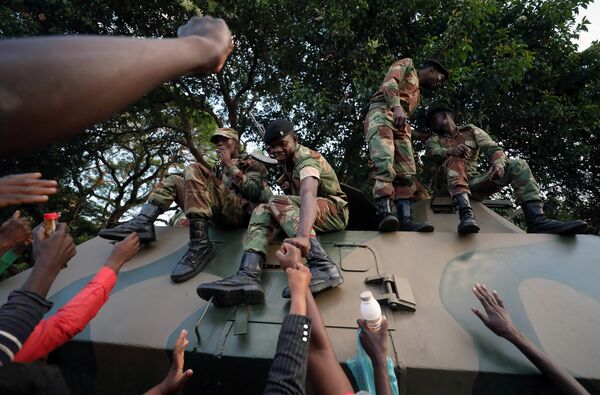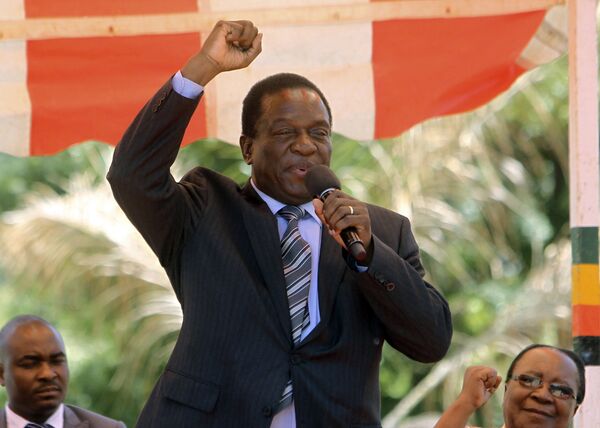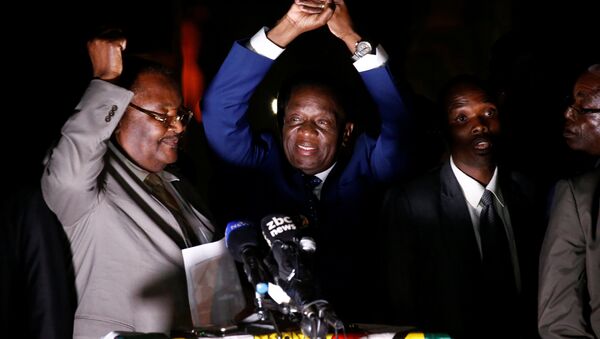Emmerson Mnangagwa has been formally sworn in as Zimbabwe's new president on Friday, replacing 93-year-old Robert Mugabe, who finally resigned on Tuesday, November 21.
Mr. Mugabe's departure after 37 years was greeted with wild scenes of jubilation on the streets of Harare.

But many people in the Matabeleland region of Zimbabwe resent Mr. Mnangagwa — who is nicknamed The Crocodile — and blame him for the so-called Gukurahundi massacres in 1983 and 1984.
WARNING: The following photos are graphic and may offend sensibilities
Y'all celebrating like Mnangagwa wasn't part of Mugabe's team of architects behind the #Gukurahundi Genocide…
— Mzilankatha (@JCubez) 15 November 2017
Butchering Over 20k Ndebele people. pic.twitter.com/Rfc1kIzVn7
'Military Carnage' in 1980s
Dr. Eliakim Sibanda, Head of the Joint Graduate Peace and Conflict Program at the University of Manitoba and University of Winnipeg in Canada, explained that 20,000 people from the minority Ndebele tribe were killed by government troops. Mr. Mnangagwa was State Security Minister at the time.
#Zimbabwe's next president ED #Mnangagwa in 1983, #Gukurahundi: '…woe unto those who will choose the path of collaboration with dissidents for we will certainly shorten their stay on earth.' pic.twitter.com/tZCK7i2MqZ
— Dewa Mavhinga (@dewamavhinga) 23 November 2017
"He was in charge of internal security in the 1980s when Mugabe deployed his North Korean-trained soldiers that carried out a military carnage among the amaNdebele, killing at least 20,000 people, raping some, and maiming others," Dr. Sibanda, who is Zimbabwean, told Sputnik.
During the war against the white-only government of Ian Smith in Rhodesia in the 1970s, there were two rebel groups — Mr. Mugabe's ZANLA, drawing most of their support from the majority Shona tribe, and ZIPRA, led by Joshua Nkomo, whose fighters were mainly Ndebele. After the war ZANLA became the ruling ZANU-PF party and ZIPRA became ZAPU, which was the main opposition party.
Former Rebel Allies Divided by Tribal Affiliations
"Soldiers were sent to the western part of the country, inhabited by the minority group, amaNdebele, ostensibly to weed out dissidents who allegedly were former ZIPRA forces that had joined the army. This included the Midlands, which was dominated by ZAPU supporters. ZANU apparently wanted to introduce a one-party state," said Dr. Sibanda.
And yes President Designate Mnangagwa must stop the slogan “Pasi” with anything it does not bind us into one nation. #Zimbabwe
— Trevor Ncube (@TrevorNcube) 23 November 2017
👇🏿 https://t.co/dVi2M2vSx2
"For at least a month journalists were not allowed in the area, food deliveries were banned by the government, as was public transportation, hospitals and clinics," he told Sputnik.
"The hatred between the two groups was nurtured and spread by government operatives keen on eliminating the Ndebele people, who would not accept the idea of a one-party state," said Dr. Sibanda.
The repression was carried out by the North Korean-trained Fifth Brigade of the Zimbabwean Army, which was also known by the Shona name Gukurahundi, which means "the early rain which washes away the chaff."
'At Least Complicit'
Was Mr. Mnangagwa, however, directly to blame?
"From a protocol point of view it is difficult to say he ordered the campaign, but as one responsible for the department that had oversight of this operation, one can say he was at least complicit," Dr. Sibanda told Sputnik.
"Only a competent court of law can help us with this question. Hence it is imperative that he proves his innocence before a competent court of law," he told Sputnik.
So could Mr. Mnangagwa still face an international human rights tribunal, like Liberia's former President Charles Taylor?
'International Community Not Interested'
"Whether this could happen, the jury is still out because the states that have the power to do so are either not interested because their business connections trump the need to support human rights or were at one time complicit with the perpetration of these atrocities, one way or the other," Dr. Sibanda told Sputnik.

There have also been claims that Margaret Thatcher's UK government deliberately downplayed the massacres at the time, because it did not want to interfere in the internal politics of its former colony, which had only won independence three years earlier after a traumatic civil war, according to Dr. Sibanda.
"Nobody was prosecuted because such countries as the USA and the UK supported and propped up the Mugabe government and without the support of these countries nothing could happen," said Dr. Sibanda.
He said Mnangagwa's takeover was not a revolution.
"This was basically a change of guard among the ZANU elites — a redistribution of positions within the party. ZANU just reinvented itself, and the broader population, because of its desperation to see Mugabe leave, joined what otherwise was ZANU's efforts to cleanse itself and gave the Mnangagwa clique full support," Dr. Sibanda concluded.


